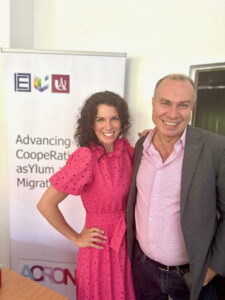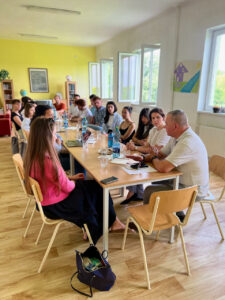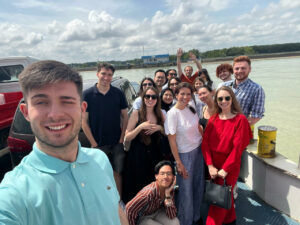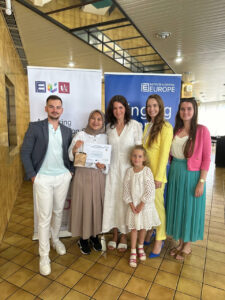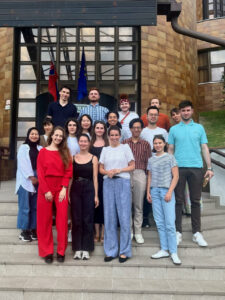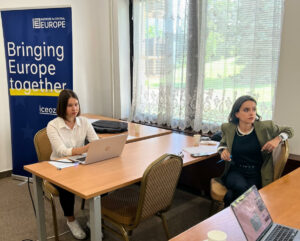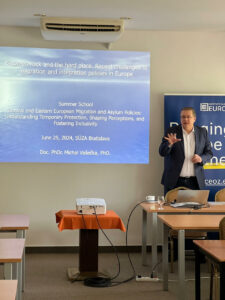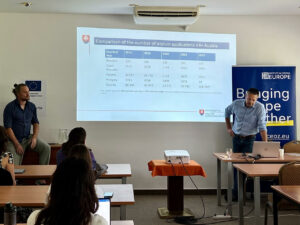International Summer School on Migration and Asylum
Bratislava, 23.-28.6.2024
The second edition of the Acronym Summer School on Migration and Asylum, titled “Central and Eastern European Migration and Asylum Policies: Understanding Temporary Protection, Shaping Perceptions, and Fostering Inclusivity” was hosted by the Institute for Central Europe in Bratislava, Slovakia. The program offered a rich blend of interactive lectures, student presentations and activities aimed at providing participants with an in-depth understanding of migration trends, perceptions, and dynamics within the Central and Eastern European (CEE) region. To add an element of fun to the learning experience, the program included a scavenger hunt combined with sightseeing in Bratislava, allowing participants to explore the city while engaging in team-building activities. Additionally, students took part in Language Café, which is a meeting point in Bratislava for international immigrants, regularly organised by the non-governmental organisation, Mareena.
The summer school commenced with a keynote lecture titled “Migration: what we know and what we see” delivered by François Gemenne, Director of the Hugo Observatory at the University of Liège, who introduced the students to the realm of migration and asylum research with an emphasis on borders, particularly European Union’s (EU) external border and the approach of EU’s leaders to migration and border control. It was followed by an insightful presentation by Clarissa do Nascimento Tabosa “Inaccessible Refuge? Examining Liberal Democracies’ Asylum Restrictive Tools. How Central Europe fits this landscape” aimed to provide a comprehensive understanding of the legal barriers and the bureaucratic structure of the asylum system in the CEE region.
Among the leading experts in migration within the CEE region, Michal Vašečka delivered a presentation titled “Between rock and the hard place: Recent challenges to migration and integration policies in Europe,” outlining the various challenges facing migration and integration policies in Europe, emphasising both historical and contemporary trends based on available data, and examining public attitudes and perceptions of migration and asylum within the CEE region. In the context of the recent Ukrainian refugee flows to the CEE region, Olena Khylko, a researcher and assistant professor at Comenius University in Bratislava, provided an outstanding overview of the Temporary Protection Directive through her presentation titled “Temporary Protection Mechanism: Refugees from Ukraine.” She discussed the directive introduced by the European Union as a response to the Ukrainian migration to the EU, detailing its implementation and challenges, while also drawing from her personal experiences as a Ukrainian refugee in Slovakia.
Students also gained insights from the former director of the Migration Office of the Ministry of the Interior of the Slovak Republic, Ján Orlovský, and crisis manager and former advisor to the Minister of Interior of the Slovak Republic, Branislav Tichý, who jointly shared their insights during the presentation titled “Practical implications of the refugee crisis from Ukraine and transit migration on the (unprepared) Slovak system.” They highlighted the mechanisms and processes of migration and asylum in Slovakia, while also recollecting their individual experiences and involvement during the events at the Slovakia – Ukraine border in February 2022.
One of the highlights of the summer school was a field trip to the refugee camp in Rohovce, organised to provide participants with a firsthand perspective on the challenges faced by refugees. Peter Privitzer, the head of the Rohovce refugee camp, guided us through the facility and explained the asylum processes for those staying at the site. Additionally, as part of the cultural program, participants visited the Danubiana Meulensteen Art Museum, enriching their understanding of local contemporary art and culture. Beyond the enlightening lectures from experts and academics on asylum and migration, and the insightful field trip to the Rohovce refugee camp, students also presented their own research, receiving valuable feedback from both their peers and experts to support their future academic development.
The Acronym summer school provided a week of academically rigorous knowledge and personal perspectives on asylum and migration in Slovakia. During this week, we welcomed 15 young researchers from 11 different countries, offering them a comprehensive educational experience while fostering a sense of community and shared purpose among future leaders and experts in migration and asylum policies. We are already looking forward to next year’s summer school in Paris – follow us for updates!
